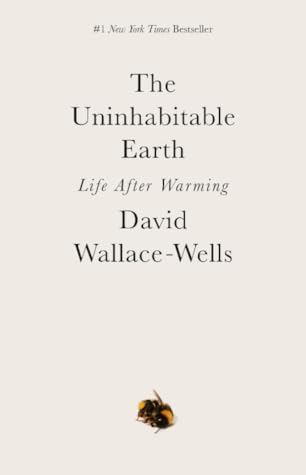More on this book
Community
Kindle Notes & Highlights
Since 1950, much of the good stuff in the plants we grow—protein, calcium, iron, vitamin C, to name just four—has declined by as much as one-third, a landmark 2004 study showed. Everything is becoming more like junk food. Even the protein content of bee pollen has dropped by a third.
In 2018, a team led by Chunwu Zhu looked at the protein content of eighteen different strains of rice, the staple crop for more than 2 billion people, and found that more carbon dioxide in the air produced nutritional declines across the board—drops in protein content, as well as in iron, zinc, and vitamins B1, B2, B5, and B9
In The Water Will Come, Jeff Goodell runs through just a few of the monuments—indeed, in some cases, whole cultures—that will be transformed into underwater relics,
Much of the infrastructure of the internet, one study showed, could be drowned by sea-level rise in less than two decades; and most of the smartphones we use to navigate it are today manufactured in Shenzhen, which, sitting right in the Pearl River Delta, is likely to be flooded soon, as well.
Every year, the average American emits enough carbon to melt 10,000 tons of ice in the Antarctic ice sheets—enough to add 10,000 cubic meters of water to the ocean. Every minute, each of us adds five gallons.
the epic “500,000-year” rainfall of Hurricane Harvey, dropping on Houston a million gallons of water for nearly every single person in the entire state of Texas;
And it’s also a reason elementary school classrooms have been found, by one study, to already average 1,000 parts per million, with almost a quarter of those surveyed in Texas over 3,000—quite
(Simple temperature rise has a robust and negative impact on test taking, too: scores go down when it’s hotter out.)
A higher pollution level in the year a baby is born has been shown to reduce earnings and labor force participation at age thirty, and the relationship of pollution to premature births and low birth weight of babies is so strong that the simple introduction of E-ZPass in American cities reduced both problems, in the vicinity of toll plazas, by 10.8 percent and 11.8 percent, respectively, just by cutting down on the exhaust expelled when cars slowed to pay the toll.
The opposite of a cognitive bias, in other words, is not clear thinking but another cognitive bias.
The cryptocurrency now produces as much CO2 each year as a million transatlantic flights.
It is more like the overwhelming awe felt by those naturalists contemplating the ancient-beyond-ancient historical grandeur of the earth, and calling it deep time.


